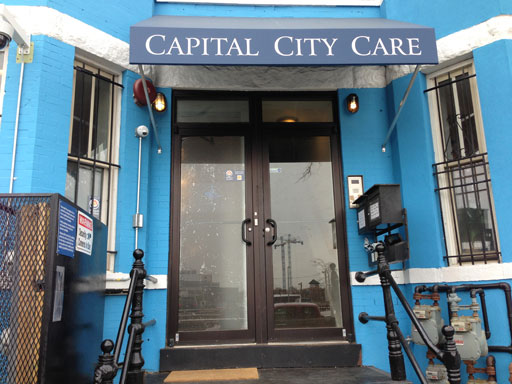
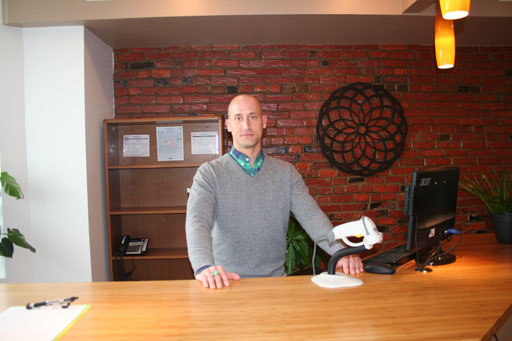
Since then, he became a believer of the healing properties of cannabis.
"When you see an MS patient ingest medical marijuana and see their spasticity subside ... it's really moving," he says. (WTOP/Alicia Lozano)

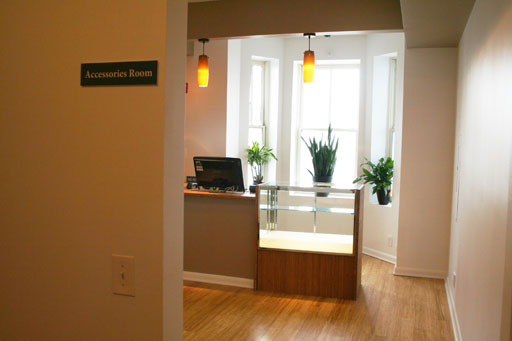
Above: In the accessories room, patients can purchase smoking tools such as rolling papers and pipes. (WTOP/Alicia Lozano)

"We even account for any kind of evaporation due to humidity levels," Guards says.
And all medicine can be tracked as it makes its way from one of the approved cultivation centers to local dispensaries.
"We are really running a very tight ship," Guard says. (WTOP/Alicia Lozano)
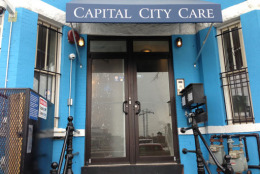
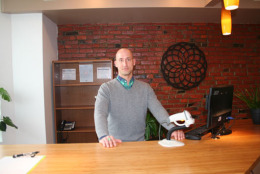


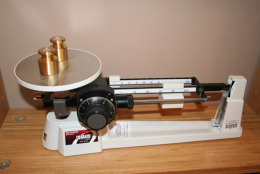
WASHINGTON – The waiting room at Capital City Care looks like a typical doctor’s office — hardwood floors, clean open space and a friendly receptionist behind the front desk.
But before patients can pass into the back room, they must first scan their index finger to prove they are allowed to be there.
Capital City Care will be D.C.’s first medical marijuana dispensary when it opens later this month. Located within sight of the Capitol Building, at North Capitol and New York avenues, this strategically placed business will serve patients suffering from life-altering diseases such as cancer, glaucoma, multiple sclerosis and AIDS/HIV.
The dispensary is opening its doors as attitudes across the country are shifting on marijuana use.
The Maryland Senate passed a medical marijuana bill Monday afternoon paving the way for a prescription program in the next few years. The House of Delegates previously approved the legislation, and it will now move to Gov. Martin O’Malley for signing.
In the District, voters approved medical marijuana in 2010.
Colorado and Washington state decriminalized general marijuana use in November. A recent Pew Research Center poll found that 52 percent of Americans favor legalizing marijuana, though 32 percent say that smoking pot is “morally wrong.”
The owners of Capital City Care are careful to differentiate between these two issues. They say their goal is not to legalize pot, but instead to provide patients access to medicine.
To become a member of Capital City Care, or any dispensary within District limits, patients must pass a robust screening process. First, they must obtain a doctor’s referral. Then, the patient will register with the D.C. Department of Health and select one dispensary to use as their primary medical marijuana source. Once the patient designates a dispensary, they can only use that one.
After receiving a medical marijuana card, the patient must overcome a few more hoops before receiving their medicine.
At Capital City Care, a member will present the card to one of the armed guards at the front door. Then, he or she will show the same ID to the receptionist, who will usher the patient into the back room after a fingerprint scan.
Once inside the product area, patients can select from an array of smokeable marijuana, edibles and concentrates. They can also purchase paraphernalia like pipes and rolling papers in a separate room.
While the process sounds daunting, it is meant to deter the kind of fly-by-night operations common in states like California, where some can obtain medical marijuana cards from “420-friendly” doctors that advertise online.
“There is accountability at every stage of the process,” says Capital City Care’s communications director Scott Morgan.
Even the marijuana is carefully labeled and screened to ensure the highest-quality product. Pests and pesticides need not apply.
“It’s being regulated right from the same department that pharmacies are regulated out of,” says general manager David A. Guard. “{The Department of Health} is scrutinizing us even harsher because of the fact that this is a Schedule 1 drug … and we invite that kind of regulation.”
At Capital City Care, the patients come first, Guard and Morgan say. They will have access to counselors who can help them cope with their illnesses, along with experts familiar with different strains and their healing properties.
“It’s common that a patient will try a couple of different varieties and find that one is really better than others for treating their symptoms,” Morgan says.
“Indica is known for helping with relaxation and sleep, and the sativa strains are better with helping mood and things like that and are more popular with patients for daytime use because it’s not as sleepy.”
Both Guard and Morgan have personal stakes not only in the success of Capital City Care, but also in the future of D.C.’s Medical Marijuana Program. Collectively, they have been pushing the medical marijuana lobby for more than a decade.
Guard says he has been involved since 1998, when some states first started passing legislation for prescription pot. He became interested in the issue after watching a close friend suffer from terminal brain cancer. His Virginia oncologist recommended cannabis, and the treatment eased some of his pain until his eventual death.
Morgan became sympathetic to medical marijuana as a teen plagued by chronic migraines. He says this is one of the first issues he voted on as a senior in high school.
Fifteen years later, the team behind Capital City Care is finally seeing their dream come true.
“Now these patients are finally getting their safe haven,” Guard says. “They don’t have to turn to the streets, the back alleys at night.”
Follow @WTOP on Twitter.







